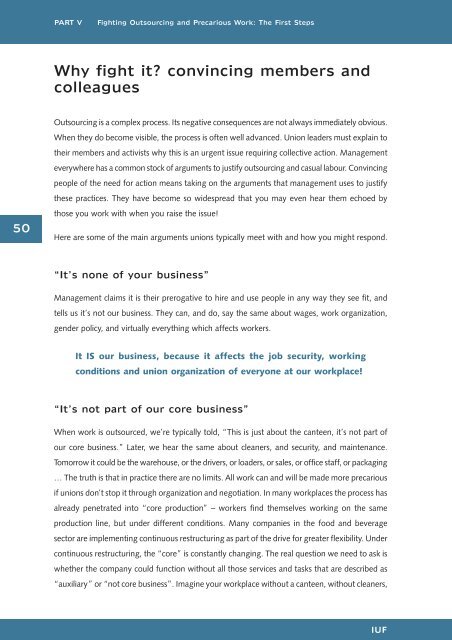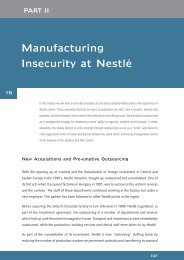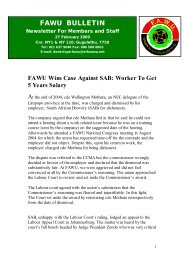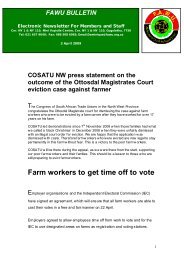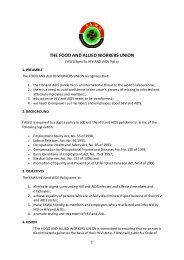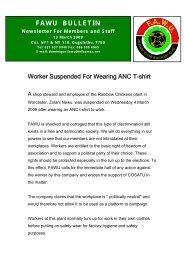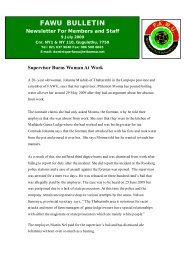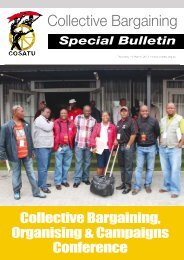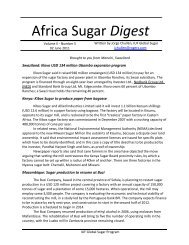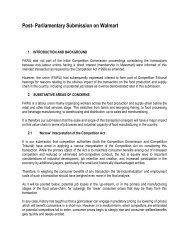PART V: Fighting Outsourcing and Precarious Work: The First Steps
PART V: Fighting Outsourcing and Precarious Work: The First Steps
PART V: Fighting Outsourcing and Precarious Work: The First Steps
Create successful ePaper yourself
Turn your PDF publications into a flip-book with our unique Google optimized e-Paper software.
50<br />
<strong>PART</strong> V <strong>Fighting</strong> <strong>Outsourcing</strong> <strong>and</strong> <strong>Precarious</strong> <strong>Work</strong>: <strong>The</strong> <strong>First</strong> <strong>Steps</strong><br />
Why fight it? convincing members <strong>and</strong><br />
colleagues<br />
<strong>Outsourcing</strong> is a complex process. Its negative consequences are not always immediately obvious.<br />
When they do become visible, the process is often well advanced. Union leaders must explain to<br />
their members <strong>and</strong> activists why this is an urgent issue requiring collective action. Management<br />
everywhere has a common stock of arguments to justify outsourcing <strong>and</strong> casual labour. Convincing<br />
people of the need for action means taking on the arguments that management uses to justify<br />
these practices. <strong>The</strong>y have become so widespread that you may even hear them echoed by<br />
those you work with when you raise the issue!<br />
Here are some of the main arguments unions typically meet with <strong>and</strong> how you might respond.<br />
“It’s none of your business”<br />
Management claims it is their prerogative to hire <strong>and</strong> use people in any way they see fit, <strong>and</strong><br />
tells us it’s not our business. <strong>The</strong>y can, <strong>and</strong> do, say the same about wages, work organization,<br />
gender policy, <strong>and</strong> virtually everything which affects workers.<br />
It IS our business, because it affects the job security, working<br />
conditions <strong>and</strong> union organization of everyone at our workplace!<br />
“It’s not part of our core business”<br />
When work is outsourced, we’re typically told, “This is just about the canteen, it’s not part of<br />
our core business.” Later, we hear the same about cleaners, <strong>and</strong> security, <strong>and</strong> maintenance.<br />
Tomorrow it could be the warehouse, or the drivers, or loaders, or sales, or office staff, or packaging<br />
… <strong>The</strong> truth is that in practice there are no limits. All work can <strong>and</strong> will be made more precarious<br />
if unions don’t stop it through organization <strong>and</strong> negotiation. In many workplaces the process has<br />
already penetrated into “core production” – workers find themselves working on the same<br />
production line, but under different conditions. Many companies in the food <strong>and</strong> beverage<br />
sector are implementing continuous restructuring as part of the drive for greater flexibility. Under<br />
continuous restructuring, the “core” is constantly changing. <strong>The</strong> real question we need to ask is<br />
whether the company could function without all those services <strong>and</strong> tasks that are described as<br />
“auxiliary” or “not core business”. Imagine your workplace without a canteen, without cleaners,<br />
IUF


